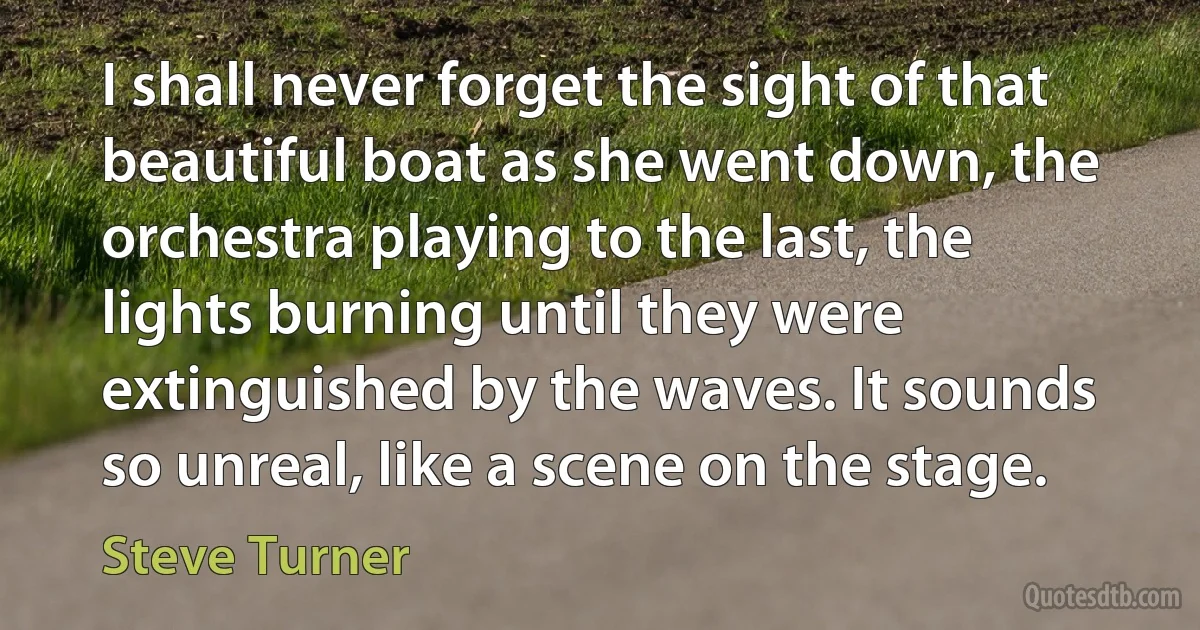Scene Quotes - page 50
Press on! there's no such word as fail!
Press nobly on! the goal is near,-
Ascend the mountain! breast the gale!
Look upward, onward,-never fear!
Why shouldst thou faint? Heaven smiles above,
Though storm and vapor intervene;
That sun shines on, whose name is Love,
Serenely o'er Life's shadow'd scene.

Park Benjamin, Sr.
A scene that has often come into my mind, both sleeping and waking - I am standing in the wings of a theatre waiting for my cue to go onstage. As I stand there I can hear the play proceeding, and suddenly it dawns on me that the lines I have learnt are not in this play at all, but belong to quite a different one. Panic seizes me; I wonder frenziedly what should I do. Then I get my cue. Stumbling, falling over the unfamiliar scenery, I make my way onto the stage, and then look for guidance to the prompter, whose head I can just see rising out of the floor-boards. Alas he only signals helplessly to me and I realise of course that his script is different from mine. I begin to speak my lines, but they are incomprehensible to the other actors and abhorrent to the audience, who begin to hiss and shout: "Get off the stage!”, "Let the play go on!”, "You're interrupting!”.

Malcolm Muggeridge
Well, for me, the real excitement of doing physical things in films, whether you're talking about a fight scene or a stunt sequence or even a love scene, for that matter, is by necessity it has to be choreographed very much like a dance. That being said, you have to rehearse it over and over again and find a mathematical precision.

Benjamin Bratt
The real thing she wanted was to play women with real depth, and a challenge, and something that she could resonate with – women that had intelligence and strength, and maturity and passion. [...] She's very close to her family – her parents, and her sisters, and her brother; very, very bonded. At some point she became aware that this is where her roots are. [...] She was always a wonderful mother. And it didn't make any difference how difficult the scene was, after the meal, Jessica spent that lunchtime with Shura, and was totally into Shura. [...] Anyone would be attracted to Sam, I would think. He's a very intelligent person and a very sweet person, first; and then he's so talented; and, on top of that, he looks great. He has a look like a pioneer, and that's very exciting. Maybe not for everybody, but it certainly would be for Jessica.

Sandra Seacat
Even though anthropologists have shown that certain primitive peoples seem to be free from the desire for power, nobody has yet shown how their state of mind can be re-created on a worldwide scale so as to eliminate the struggle for power from the international scene. ... International politics, like all politics, is a struggle for power.

Hans Morgenthau
The dominant, almost general, idea of revolution - particularly the Socialist idea - is that revolution is a violent change of social conditions through which one social class, the working class, becomes dominant over another class, the capitalist class. It is the conception of a purely physical change, and as such it involves only political scene shifting and institutional rearrangements. Bourgeois dictatorship is replaced by the "dictatorship of the proletariat" - or by that of its "advance guard," the Communist Party. Lenin takes the seat of the Romanovs, the Imperial Cabinet is rechristened Soviet of People's Commissars, Trotsky is appointed Minister of War, and a labourer becomes the Military Governor General of Moscow. That is, in essence, the Bolshevik conception of revolution, as translated into actual practice.

Emma Goldman
Here everything is dark. A series of storms has destroyed all our hopes which were full of promise. A plentiful hay harvest drowned and the finest wheat the farmers have had for years all laid. It is a scene of ravage, of havoc like a conquered country. It is the last drop in the bitter cup which the landed interest will have to swallow. ... As for politics, Gladstone will be as fatal to the aristocracy as the weather; and if he were younger the Crown would not be safe.

Benjamin Disraeli



